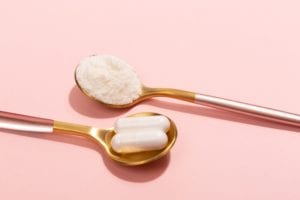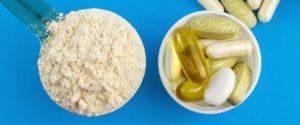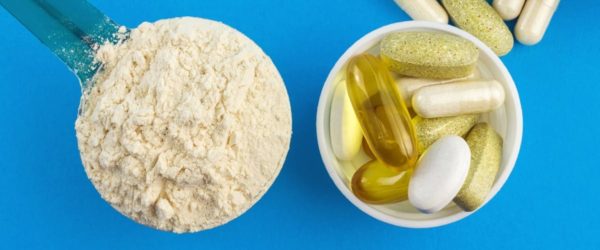
In recent years, collagen has exploded in the wellness world. Odds are you have seen a plethora of powders, capsules, smoothie mixes…you name it… at grocery and health food stores. These brands tout several different benefits, everything ranging from radiant skin to healthy joints to weight loss. Let’s delve more into the science behind this popular supplementation and whether or not these claims have merit.
Collagen is a protein, and it is a major component of many connective tissues in the body, including tendons, ligaments, skin, and muscle. You can think of it as a kind of scaffolding for the body. As we age, the supply in our bodies begins to be broken down faster than it is built. This can contribute to the formation of wrinkles, joint pain, and loss of muscle.
Over the last several years, there have been plenty of studies done to further examine the affects collagen can have on the aforementioned issues. Generally, the science behind supplementation is still fairly new and further research is needed to conclusively determine whether or not taking or consuming collagen can have a significant effect on skin, joint health, and muscle. Let’s delve into a few recent studies…
Collagen for Skin Health
Collagen is a crucial part of our skin as it functions to maintain elasticity, moisture, and smoothness. In one study performed in 2013, skin elasticity was the primary outcome being measured across 3 different treatment groups; one of which took 2.5 grams of supplement daily, one or which took 5 grams of supplement daily, and one of which took a placebo. The study continued for 8 weeks and the researchers also performed a 4-week follow-up. The results showed that skin elasticity in both treatment groups (2.5 grams and 5 grams) had significantly improved, compared to those in the placebo group. Positive effects were shown in regard to skin moisture, but those changes did not rise to the level of statistical significance.
Collagen also appears to improve skin health by minimizing the depth and appearance of wrinkles and fine lines. This is thought to occur because the supplementation can stimulate your body to produce more of this protein on its own. The research on the anti-aging properties of collagen is overall inconclusive, as it appears to have some positive, short-term effects on the appearance of wrinkles but does not seem to make a significant long-term impact.
If you have concerns about your skin health, texture, or appearance, visit Julie at CHARMedSpa (located inside of CHARM) https://charmaustin.com/medspa-coming-soon/
Collagen for Joint Health

As stated earlier, collagen is an integral protein of different structures of the body, one of which is cartilage. Cartilage is found around our bones and helps to maintain the integrity of joints, especially weight-bearing joints such as the knees. As we age, the amount of this protein in cartilage decreases which can contribute to the development of degenerative bone diseases such as arthritis.
In a systematic review of the literature, researchers concluded that collagen, taken orally, can accumulate in cartilage over time which contributes to the building of more collagen and stronger cartilage. Due to the cellular structure of cartilage, any time it rebuilds, whether it be after an injury or in response to taking collagen, the new cartilage that is laid down is not as strong as the original. However, several studies showed that after taking supplements regularly participants reported:
- Less joint pain at rest and during physical activity
- Improved ability to participate in exercise and sports
- Improved functional status
Although further research is needed, it would appear that regularly taking supplements can help manage the inflammation, pain, and joint deterioration that is associated with conditions such as arthritis. https://charmaustin.com/relieve-pain-and-repair-injury/
Collagen for Building Muscle
Collagen is also an essential component of muscle and when combined with regular resistance training may help improve muscle mass and strength. In one study, researchers evaluated muscle mass and muscle function after 12 weeks of a guided resistance training program plus a daily 15 grams collagen supplement. Compared to the control group, which did not receive the supplement, the intervention group demonstrated significantly higher muscle mass and lower fat mass at the conclusion of the study. It would appear that taking this type of supplement can assist with building muscle and decreasing fat. https://charmaustin.com/restore-function-and-return-to-living/neuromuscular-activation-method/

Sources
Proksch E, Segger D, Degwert J, Schunck M, Zague V, Oesser S. Oral supplementation of specific collagen peptides has beneficial effects on human skin physiology: a double-blind, placebo-controlled study. Skin Pharmacol Physiol. 2014;27(1):47-55. doi: 10.1159/000351376. Epub 2013 Aug 14.
Ganceviciene R, Liakou AI, Theodoridis A, Makrantonaki E, Zouboulis CC. Skin anti-aging strategies. Dermatoendocrinol. 2012;4(3):308-319. doi:10.4161/derm.22804
Bello AE, Oesser S. Collagen hydrolysate for the treatment of osteoarthritis and other joint disorders: a review of the literature. Curr Med Res Opin. 2006 Nov;22(11):2221-32. doi: 10.1185/030079906X148373. PMID: 17076983.
Zdzieblik D, Oesser S, Baumstark MW, Gollhofer A, König D. Collagen peptide supplementation in combination with resistance training improves body composition and increases muscle strength in elderly sarcopenic men: a randomised controlled trial. Br J Nutr. 2015;114(8):1237-1245. doi:10.1017/S0007114515002810
https://www.healthline.com/nutrition/collagen-benefits#4.-Could-boost-muscle-mass





